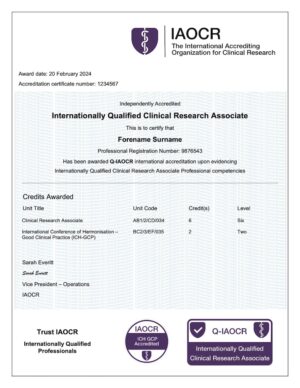To accelerate your CRA career you need to actively pursue opportunities. One can climb the career ladder with little effort, particularly if your organisation is naturally expanding. However, if you want to push against the timeline and move up at a faster rate, you need to make hiring managers aware of your enthusiasm and eager to take you on board.
If you are feeling frustrated at the lack of progression in your career we have some advice for you. Below are eight endeavours that will aid your dynamic rise up the career ladder.
Set a timeline for your CRA career
You cannot wait on someone else’s timeframe to move up the ladder and to do so with some confidence.
It is common for people to feel that they are stuck in a single role for too long and years can go by very quickly in one job. And the longer they are in that job, the more difficult it feels for them to apply for a new job. They become fearful of change and lack confidence in their ability to take on a new role.
Plan out steps on your career ladder: whether that’s relocating, choosing a larger or smaller company to work for, or moving into a new specialism. Even if your current role has negatives, you have a chance of enjoying the positives knowing that you’ll be moving on and up soon. Build confidence
Taking up a new job and new responsibilities is daunting. Use the other seven endeavors in this article to build a case for why you’re a great candidate for promotion. Remind yourself of your worth.
Practice change
Pursue new responsibilities in your current role to gain experience. Taking on new responsibilities or changing the way you do your current job are great ways of building experience in managing change. Even if a new responsibility is temporary or on an ad hoc basis or unpaid can still go down on your resume as something you accomplished. Don’t underestimate the experience you can have even on a short-term project or the long-term effects it can have on your future CRA career.
Volunteer for leadership opportunities
Staff management is one of the key responsibilities of higher roles. If you don’t have this kind of leadership experience, you can start with informal team management duties in your current job or organisation. It isn’t just the level of responsibility that you take on that matters; it’s your willingness to step up and take any responsibility that sets you apart from others.
Develop Expertise in Emerging Areas
Is there an emerging area in clinical research that you have an interest in? Would knowing a little more about it help with a promotion into the area? Attending relevant webinars, industry talks, workshops or even reading an industry report can provide insights.
Embrace Technology and Innovation
Familiarize yourself with the latest clinical trial management systems, electronic data capture tools, and other digital innovations. You may notice that job descriptions for a future role you are interested in ask for experience in software you have yet to use in a professional capacity. Much like seeking out advanced education options (below), nothing is stopping you from getting to grips with new tools in your own time. They may aid you in your current job as well as your long-term CRA career path.
Take Calculated Risks
Many CRAs prefer staying in their comfort zones, avoiding risks that could lead to significant career advancement.
But keep an open mind and you could identify opportunities that involve a degree of risk but offer high potential rewards. This may be relocating, switching to a different therapeutic area, or joining a company with a different culture. Weigh the pros and cons carefully, and be prepared to step out of your comfort zone for substantial career growth.
Pursue Advanced Education and Certifications
Continuing professional development in the form of advanced education, accreditation or certifications enhances your attractiveness for higher roles. It can be hard to motivate oneself to make time for study but the return on investment is a long-term one. Use your CRA career path schedule (above) to plan your study and remind yourself why you are allocating time and effort to formal accreditation.










